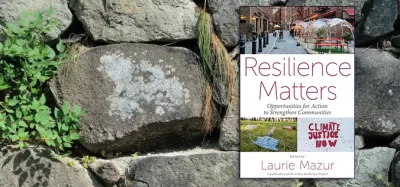In this hopeful and frustrating year, contributors to the Island Press Urban Resilience Project celebrate our collective progress and challenges in a new free book of short and sweet articles, op-eds, and interviews. Essential reading for planners!

In 2021, all the good news came with an asterisk.
American democracy survived an unprecedented assault on January 6, but the nation is more bitterly polarized than ever. Lifesaving COVID-19 vaccines were developed in record time, but a substantial swath of the American public refused to get the jab. The Biden administration swept into office on promises to tackle climate change and "build back better," but progress was thwarted by key lawmakers on both sides of the aisle.
In this hopeful and frustrating year, contributors to the Island Press Urban Resilience Project (URP) celebrated our collective progress, while highlighting how far we have yet to go. Those ideas—originally published as articles, op-eds, and interviews—have now been collected in a new e-book Resilience Matters: Opportunities for Action to Strengthen Communities, available at no cost.
FULL STORY: Resilience Matters: Opportunities for Action to Strengthen Communities

Trump Administration Could Effectively End Housing Voucher Program
Federal officials are eyeing major cuts to the Section 8 program that helps millions of low-income households pay rent.

Planetizen Federal Action Tracker
A weekly monitor of how Trump’s orders and actions are impacting planners and planning in America.

Ken Jennings Launches Transit Web Series
The Jeopardy champ wants you to ride public transit.

Washington Legislature Passes Rent Increase Cap
A bill that caps rent increases at 7 percent plus inflation is headed to the governor’s desk.

From Planning to Action: How LA County Is Rethinking Climate Resilience
Chief Sustainability Officer Rita Kampalath outlines the County’s shift from planning to implementation in its climate resilience efforts, emphasizing cross-departmental coordination, updated recovery strategies, and the need for flexible funding.

New Mexico Aging Department Commits to Helping Seniors Age ‘In Place’ and ‘Autonomously’ in New Draft Plan
As New Mexico’s population of seniors continues to grow, the state’s aging department is proposing expanded initiatives to help seniors maintain their autonomy while also supporting family caregivers.
Urban Design for Planners 1: Software Tools
This six-course series explores essential urban design concepts using open source software and equips planners with the tools they need to participate fully in the urban design process.
Planning for Universal Design
Learn the tools for implementing Universal Design in planning regulations.
Heyer Gruel & Associates PA
Ada County Highway District
Institute for Housing and Urban Development Studies (IHS)
City of Grandview
Harvard GSD Executive Education
Toledo-Lucas County Plan Commissions
Salt Lake City
NYU Wagner Graduate School of Public Service


























